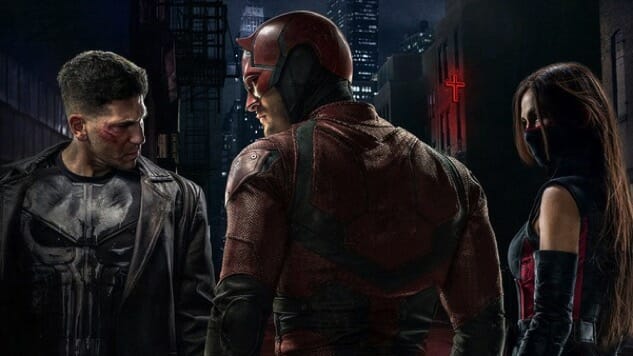Daredevil‘s Dark Knight Syndrome: It Doesn’t Like its Hero Nearly as Much as It Loves its Villains

Even in a genre as reliant on suspension of disbelief as the superhero sub-genre, Netflix’s Daredevil requires a pinch of salt. Consider the premise for its recently-launched second season: Seeking revenge for the murder of his wife and children, PTSD-dazzled vet Frank Castle (Jon Bernthal) storms NYC’s Hell’s Kitchen to execute the criminal gangs that run the city and slaughtered his family. When the might of the law fails to successfully apprehend Castle, it comes down to none other than the legally blind Matt Murdock (Charlie Cox)—lawyer by day, non-sighted spandexed crimefighter by night—to bring him down.
That the core conceit is this ridiculous is a big part of why Daredevil can be forgiven for so much. It’s an imperfect stab at making a grown-up comic book saga, for older graphic novel enthusiasts and once-teens, now into adulthood—those who grew up witnessing superhero cinema’s initial explosion in the early aughts. The dialogue is patchy, the mixture of tones isn’t always harmonious, and the action is hit-or-miss depending on who’s directing. Meanwhile the show’s cast can be the greatest in one scene (up until only very recently, you wouldn’t have seen actors of Vincent D’Onofrio and Jon Bernthal’s calibre teaming up to defeat a cabal of magic ninjas on the small screen) and the worst in the next (hello, Elden Henson and Elodie Yung).
Daredevil is a glossy, yet uneven pulp noir, but the very set-up means you never take it seriously enough to count its transgressions. It’s a show about an attorney-cum-urban warrior with a strict no-kill policy, singlehandedly defeating New York’s criminal fraternity with a billy club and a fast pair of fists. Once you’ve accepted that, you can deal with a few stale lines of dialogue and the occasional wooden performer.
There is, however, one problem with Daredevil that’s difficult to overlook.
In Season One, Daredevil’s writers went to great lengths to elicit compassion for their baddie, Vincent D’Onofrio’s refined crime boss Wilson Fisk. He was the show’s MVP, a rare Marvel screen villain more interesting and often more sympathetic than the hero. But while Season One stopped short of glamorizing its bad guy, Daredevil’s second run plainly appears to enjoy Frank Castle’s pathological rampage. With the PG-13 restrictions reserved for its big-screen Marvel counterparts lifted, Daredevil revels in violence and darkness. The show’s writers obviously enjoy the freedom they’ve been given to explore taboo territory for the genre (Drugs! Swearing! Car door-based decapitations!), but their enjoyment comes, arguably, at the expense of their show’s hero.
-

-

-

-

-

-

-

-

-

-

-

-

-

-

-

-

-

-

-

-

-

-

-

-

-

-

-

-

-

-

-

-

-

-

-

-

-

-

-

-








































